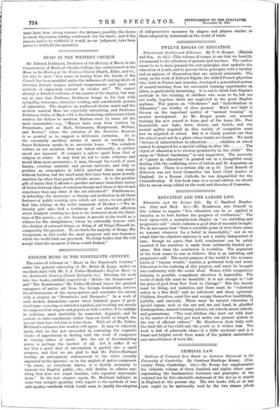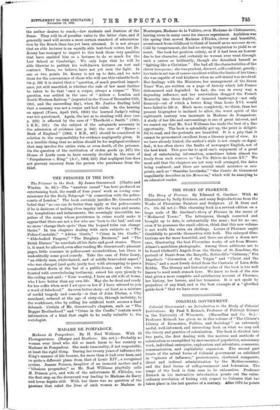CRIMINAL LAW.
Outlines of Criminal Law Based on Lectures Delivered in the University of Cambridge. By Courtney Stanhope Kenny. (Uni- versity Press, Cambridge. 10s.)—Dr. Kenny has supplemented his valuable volume of three hundred and eighty select cases expounding the fundamental doctrines and principles of the criminal law by this admirable statement of the law as it stands in England at the present day. The two books will, or at any rate ought to, be universally used by the two classes /them the author desires to reach,—law students and Justices of the Peace. They will be of peculiar value to the latter class, and if generally used will secure a more certain standard of administra- tion by the Bench than has yet been attained. It is not always that an able lecturer is an equally able text-book writer, but Dr. Benny has managed to impart to this book those very qualities that have enabled him as a lecturer to do so much for the Law School at Cambridge. We only hope that he will be able likewise to publish his well-known lectures on tort and contract. These, we believe, have not yet seen the light. In one or two points Dr. Kenny is not up to date, and we note- them for the convenience of those who will use this valuable book. On p. 192 it is stated that a " question,.of much practical import- ance, yet still unsettled, is whether the rule of law must further be taken to be that once a corpse, always a corpse.' " This question was settled in the case of "Aitken v. London and North-Western Railway " (reported in the Times of December 11th, 1901, and the succeeding day), when Mr. Justice Darling held that a mummy was not a corpse and had value. In the hearing on appeal (Times, April 18th, 1902) the learned Judge's ruling was not questioned. Again, the law as to stealing wild deer (see p. 222) is affected by the case of " Threlkeld v. Smith" (1901, 2 K.B., 531). On the subject of the safeguards necessary in the admission of evidence (see p. 342) the case of " Bynoe v. Bank of England" (1902, 1 K.B., 467) should be considered in relation to the responsibility for evidence negligently given. It is a terrible thing that no action should lie for negligent evidence that may involve the entire ruin, or even death, of the prisoner. On the question of the restitution of stolen goods (p. 227) the House of Lords seem to have recently decided in the case of "Farquharson v. King" (A.C., 1902, 325) that negligent lose does not prevent recovery from the person who purchases from the thief.























































 Previous page
Previous page